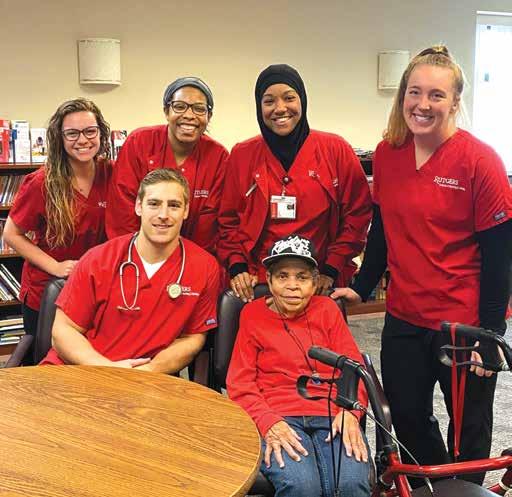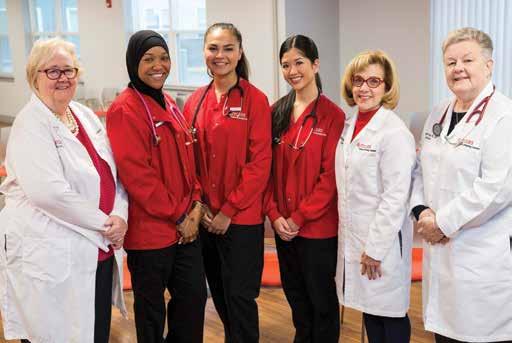
8 minute read
HOMETOWN CARE
By Jeanne Leong
Melody McCulley was greatly moved by making a difference. A registered nurse in the doctor of nursing practice program in the Rutgers School of Nursing–Camden, McCulley is among students and faculty who have worked clinical rotations at the new universitysponsored health center in the Branches at Centerville housing complex in Camden. Since the Rutgers–Camden health center opened its doors in November 2019, faculty and students have provided more than 500 hours of services to residents—including conducting blood pressure screenings and hearing tests, and offering classes on first aid, nutrition, and managing chronic health problems, such as diabetes. Students and faculty at the center also have performed more than 90 physical exams for children who needed them in order to participate in sports leagues. “Organized sports are such a tremendous emotional and physical outlet for children,” said McCulley, a resident of Marlton, New Jersey, who earned her bachelor’s degree in nursing from Rutgers‒Camden in 2016. “A lot of these kids would not have been able to participate in these sports if we weren’t able to provide that service for them.”
Advertisement
Her experience in the health center has influenced McCulley’s career plans—she wants to work in a pediatric health clinic in an underserved community after she completes her doctorate in 2021. “I learned how fulfilling it is to provide a service that helps our neighbors,” she said.
McCulley is just one of many School of Nursing students who provide pro bono nursing services in the community. Most of the nearly 1,000 Rutgers School of Nursing‒Camden undergraduate students and 80 graduate students perform clinical rotations at hospitals, schools, or communitybased settings. With the addition of the health center at the Branches at Centerville housing complex and a program that sends students to work with senior citizens in the Northgate housing complex in North Camden, the School of Nursing continues to grow the number of people in Camden it serves. “We take our students out into settings where they can have an authentic experience in one-to-one interactions caring for patients where they need it most—in their community,” said Donna Nickitas, dean of the School of Nursing. “We are committed to being civically responsible and meeting the needs of Camden residents.”
Through collaborations with the city of Camden, community groups, and local health and social service organizations, Rutgers‒Camden is a driving force to improve the health of city residents. The newest of these efforts is the health center at the Branches at Centerville, which partners the university with the Housing Authority of the City of Camden and The Michaels Organization, the company that is constructing additional homes in the complex and is donating the space for the health center. “Having a health center located within the complex where these families live is a true asset in disease prevention and
Rutgers School of Nursing–Camden Programs Take Health Care Services into the Community
Valora Ballance, center, a resident of the Branches at Centerville, has her blood pressure checked by School of Nursing students Yaazmyn Rosa, at left, and Keana Aquino at the Rutgers health center in the Camden housing complex.
care,” said Carmen Rodriguez, director of the City of Camden Department of Human Services. “The presence of the health center serves as a reminder for individuals to be proactive in taking care of themselves.”
Valora Ballance, who has lived at the Branches at Centerville for more than two years, is very happy about the new center. She has participated in the center’s educational programs, and one day when she was not feeling well, she stopped by for a checkup. “They checked my blood pressure,” she said. “It’s a good thing I went because it was very high, so I knew to follow up with my primary care doctor.”
Ballance since has been back to the center to have her blood pressure rechecked. It has dropped to a safer level. She is now an advocate for the center and encourages her neighbors to make use of the services offered by Rutgers faculty and students. “It’s a good service to have,” she said.
Victor Figueroa, executive director of the Housing Authority of the City of Camden, said the free care provided by the School of Nursing is a valuable benefit. “We admire and appreciate the quality of the staff and student nurses and the professionalism and dignity they bring to our residents and the community,” Figueroa said. “This partnership has been such a positive experience and they truly care about the health and welfare of our families.”
Students Working with Camden Senior Citizens
At Camden’s Northgate II affordable housing complex, one of two towers near the entrance to the Ben Franklin Bridge, nursing students provide inhome consultations to solve complex care issues for the elderly. Through the New Jersey Geriatrics Workforce Enhancement Program, led by the Rowan School of Osteopathic Medicine in partnership with the Rutgers School of Nursing–Camden, students visit residents weekly to check for health issues common to senior citizens, including depression, dementia, and risk for falling. The students review medications with the residents, provide them with education about health issues, and advise them on ways to stay safe in their homes. Students sometimes will recommend that a resident have a

follow-up visit with their primary care provider for issues such as memory loss or trouble walking.
Yaazmyn Rosa said her weekly visits to Northgate II were some of the most inspiring experiences in her education. Rosa, who graduated in December 2019, and her classmates in the accelerated bachelor of science in nursing program were among a team of health care workers and social workers who provide in-home consultations for seniors citizens who live in the tower. “What you’re learning in class, you’re able to put it in practice,” Rosa said.
The experience at Northgate II also helps to boost the students’ confidence in their nursing skills. “It was nice to work together as a team, and say, ‘OK, I can explain this’ and ‘I can help them with these issues,’” said nursing student Emily Kahn of Cherry Hill.
Clockwise, from front right: Northgate II housing complex resident Armado Picox with nursing students Carmen Iossa, Emily Kahn, Erin McGrier, Yaazmyn Rosa, and Taylor Johnson.
Camden Partnerships
In a partnership between the Rutgers School of Nursing–Camden and the Camden Coalition of Healthcare Providers, nursing students screen Medicare and Medicaid patients at the Virtua Healthcare Emergency Department in Camden and Cooper University Hospital’s labor and delivery floor for a variety of issues, including housing and food insecurity, lack of transportation, interpersonal violence, and difficulty in paying for utilities.
The nursing students provide patients with resources to help them apply for aid and direct them on a course to get their basic needs met for health care, housing, food, personal and family stability, and education. People with two or more emergency department visits in the last 12 months are directed to community health workers who will help them find a primary care provider. “We are really excited to have nursing students participate because they can bring their knowledge and their skills and also get a better understanding of how the social-related needs can impact people’s ability to access care, receive care, and become well,” said Andrew Katz, associate director of accountable health communities at the Camden Coalition of Healthcare Providers.
The project is just one example of the School of Nursing’s holistic approach to Camden residents’ overall health and well-being. “We’re looking at the social determinants of health,” Nickitas said. “Individuals who are exposed to high levels of poverty, food insecurity, homelessness, lack of transportation, and illiteracy have sustained challenges on a daily basis.”
She said addressing residents’ social and personal issues along with their medical needs will ultimately lead to improved health. “Helping people improve their health also helps them improve other aspects of their lives,” she said.
At the Branches at Centerville health center, from left: Marie O’Toole, senior associate dean; students Yaazmyn Rosa, Karina DeCasablanca, and Keana Aquino; Donna Nickitas, dean; and Kathie Prihoda, clinical assistant professor.

An example of how the School of Nursing faculty have facilitated this holistic approach is an effort to bring nutritious food to Camden residents. While conducting research on the health concerns of Camden residents, Kathy Jackson, a nurse practitioner and clinical assistant professor in the School of Nursing, discovered that in addition to a desire for quality health care, residents also wanted access to fresh fruits and vegetables. Through a partnership initiated by Jackson in 2015, Farmers Against Hunger, an initiative of the New Jersey Agricultural Society, has been delivering fresh fruits and vegetables to the Ablett Village housing development during the growing season from mid-June through the fall.
Jackson is also a key player in a partnership with Project H.O.P.E., which offers health care services for the homeless. One day a week Jackson and other Rutgers–Camden nursing faculty provide preventative care to patients at Cathedral Kitchen, a nonprofit mission in Camden that “uses food to change lives.” The care is a cost benefit to local health care systems since it prevents future expensive emergency room visits or hospitalizations.
In fall 2019, a group of students led by Marie O’Toole, senior associate dean and professor of nursing, provided free flu vaccines to guests having meals at Cathedral Kitchen. O’Toole said such experiences can have significant impact on career choices. “Some students enter nursing school saying they want to work in a high-paced, high-tech hospital environment, but when they see how much needs to be done in the community, this is an option they might want to consider,” O’Toole said.
Nickitas agrees that having a hand in improving healthcare in the community is rewarding for students, faculty, and administrators. “To be in the city of Camden and to provide health care at no cost and having the opportunity to feel that you could make a difference just blocks away from campus—that’s a great return on our investment,” Nickitas said.










